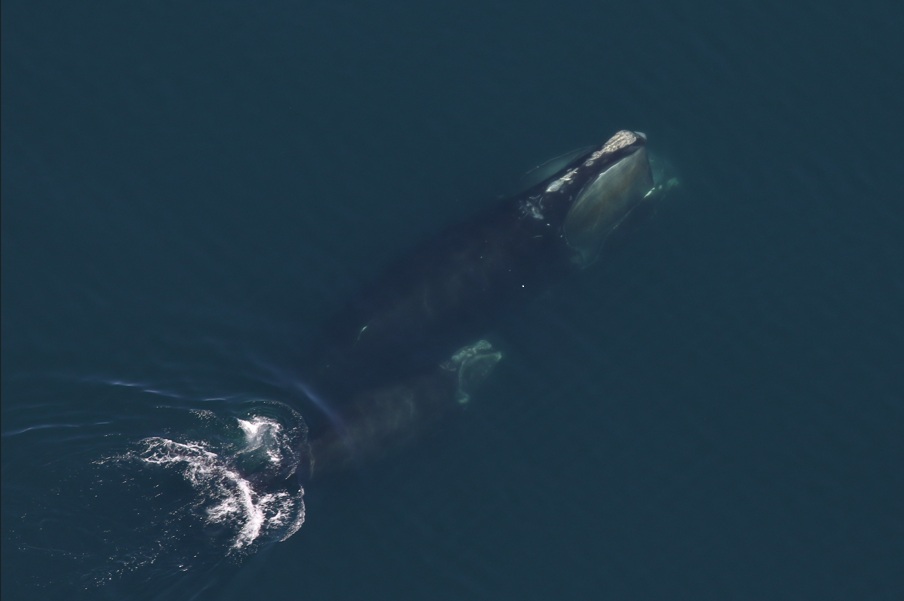Top Stories
North Atlantic Right Whale Population Surges to 384: Urgent Update

UPDATE: The critically endangered North Atlantic right whale population has surged to 384, marking a significant 2.1% increase from last year’s estimate of 376, scientists announced today. This hopeful news comes as researchers from the New England Aquarium’s Anderson Cabot Center for Ocean Life and NOAA collaborate to assess population health, revealing a potential turning point for this vulnerable species.
With no recorded mortalities and fewer injuries compared to recent years, experts express cautious optimism.
“It’s always a great feeling when we can share positive news about this critically endangered species,”
said Heather Pettis, who leads the right whale research program at the Aquarium. “The slight increase in the population estimate, coupled with no detected mortalities and fewer detected injuries than in the last several years, leaves us cautiously optimistic about the future of North Atlantic right whales.”
However, the fight for survival is far from over. The leading threats—entanglements and vessel strikes—continue to pose severe risks to these majestic creatures. Following a troubling year in 2024 with five right whale deaths, 16 entanglements, and eight vessel strikes, this year has provided a welcome reprieve. So far in 2025, scientists have logged no deaths, one new entanglement injury without attached fishing gear, and only one vessel strike.
Despite the positive trend, challenges remain. Many right whales still carry injuries from previous entanglements, and more incidents could arise later this year. Notably, 50% of the entanglements in 2024 were detected during the latter half of the year.
“Detecting entanglements is challenging as it requires two things to align: people to be looking and whales to be present,”
explained Philip Hamilton, a senior scientist at the Aquarium. “That’s why it is so important to have continued collaboration with state, federal, and private entities to ensure right whales are monitored throughout their range in the U.S. and Canada.”
A particular focus has been on Catalog #5110, a whale spotted last December with fishing gear still attached. It was recently seen again in Cape Cod Bay, demonstrating the ongoing struggle these animals face. While rescuers made efforts to remove some gear, significant portions remain, highlighting the persistent challenges to the survival and recovery of this species.
“The case of Catalog #5110 is a sad reminder of the prolonged suffering these individual whales endure,”
Pettis remarked.
In a positive development, eleven calves were born this season, with four first-time mothers among them. However, the 2025 calving numbers lagged behind expectations. Notably, two mothers were observed in unexpected locations: “Accordion” (Catalog #4150) off New York in February and “Monarch” (Catalog #2460) in Cape Cod Bay in April, showcasing the dynamic behaviors of these whales.
“In recent years, right whales have been delaying giving birth to their first calf until they are older,” Hamilton noted. “It is encouraging to see four of these older females join the reproductive pool this year. The future of the species rests on their broad backs.”
As the North Atlantic right whale population begins to recover, conservationists stress the importance of ongoing protective measures. The small increases in numbers bring hope, but experts warn against complacency, urging continued efforts for management and conservation to ensure these whales thrive in the future. The battle for the North Atlantic right whale continues, and every small victory is crucial in their path toward recovery.
-

 Science1 week ago
Science1 week agoResearchers Challenge 200-Year-Old Physics Principle with Atomic Engines
-

 Politics1 week ago
Politics1 week agoNHP Foundation Secures Land for 158 Affordable Apartments in Denver
-

 Health1 week ago
Health1 week agoNeuroscientist Advocates for Flag Football Until Age 14
-

 Lifestyle1 week ago
Lifestyle1 week agoLongtime Friends Face Heartbreak After Loss and Isolation
-

 Health1 week ago
Health1 week agoFDA Launches Fast-Track Review for Nine Innovative Therapies
-

 World1 week ago
World1 week agoTroops to Enjoy Buffalo Chicken, Thai Curry in 2026 MREs
-

 Business1 week ago
Business1 week agoMaine Housing Inventory Surges to Post-Pandemic High
-

 Top Stories1 week ago
Top Stories1 week agoUnforgettable Moments: The Best Victoria’s Secret Performances
-

 Politics1 week ago
Politics1 week agoIsraeli Air Strikes in Lebanon Kill One, Wound Seven Amid Tensions
-

 Politics1 week ago
Politics1 week agoMassachusetts Lawmakers Resist Audit After Voter Mandate
-

 World1 week ago
World1 week agoGlobal Military Spending: Air Forces Ranked by Budget and Capability
-

 Business1 week ago
Business1 week agoSpirit Airlines Cuts Workforce with Furloughs for 365 Pilots









